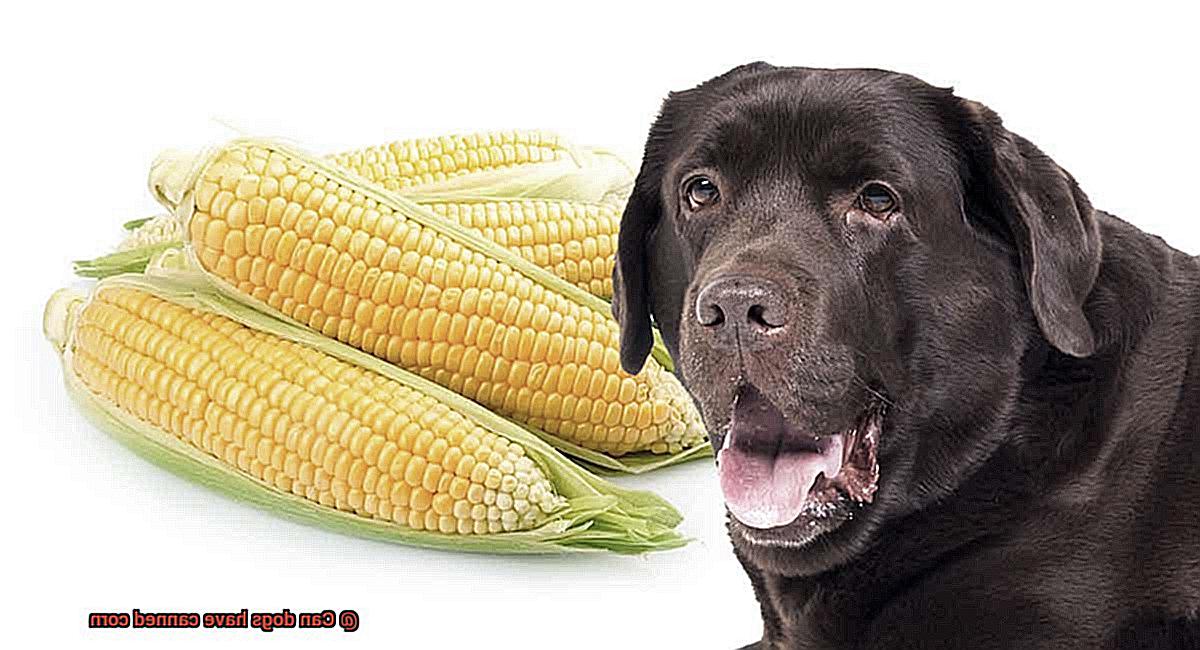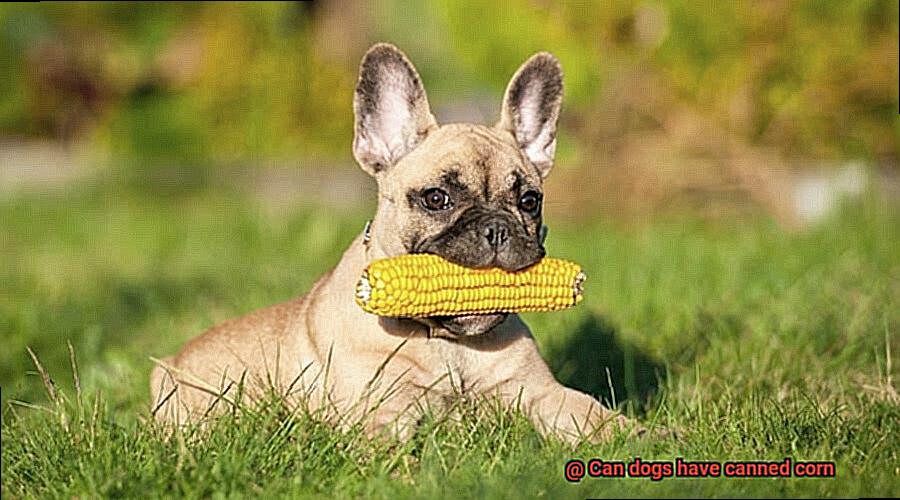Can dogs have canned corn?
We all know how much our furry friends love to chow down on a tasty treat every now and then. As a dog owner, it’s only natural to wonder about the safety of certain human foods for your beloved pup. And one food that often sparks curiosity is canned corn.
Corn, that golden staple in our diets, can also be found in many dog food formulas. But what about cracking open a can of corn just for our four-legged companions? Today, we’re diving deep into the pros and cons of sharing this yellow temptation with your pooch, while shedding light on any potential health risks.
On the bright side, canned corn can offer some pawsome benefits for your furry buddy. Not only is it jam-packed with essential nutrients like fiber, vitamins, and minerals, but its sweet taste can also make mealtime even more delightful. Plus, corn provides an energy boost and can help keep their digestion in tip-top shape.
However, let’s not turn a blind eye to the downsides. Dogs are mainly carnivores, and their bellies aren’t built to handle large amounts of carbohydrates like corn. With its starchy nature, overindulging might lead to unwanted weight gain or even worsen existing allergies or sensitivities.
While it’s generally safe to share small portions of canned corn as an occasional treat, pet owners should always be mindful of the potential risks. Some dogs may experience tummy troubles like bloating, gas, or even diarrhea if their digestive systems don’t agree with corn’s high fiber content.
And here’s another thing to watch out for – some canned corn products come loaded with added salt or seasonings that can spell trouble for our furry pals. Especially those with pre-existing medical conditions like heart or kidney problems. So be sure to read those labels carefully or opt for plain canned corn without any harmful additives.
Remember, moderation is key when treating your dog to canned corn. It’s always a good idea to consult with your veterinarian about your pup’s specific dietary needs and any concerns you might have.
In conclusion, while dogs can enjoy small amounts of canned corn, it’s important to be cautious about the potential risks associated with this human food. As responsible pet owners, our furry friends’ health and well-being should always take precedence. So if you ever decide to share a spoonful of that sweet, golden delight, do it with care
What Is Canned Corn and Its Nutritional Benefits for Dogs?
Contents
- 1 What Is Canned Corn and Its Nutritional Benefits for Dogs?
- 2 Is Canned Corn Safe for French Bulldogs?
- 3 How Much Canned Corn Can French Bulldogs Have?
- 4 Potential Allergies and Sensitivities to Canned Corn in French Bulldogs
- 5 Common Symptoms of Too Much Canned Corn in French Bulldogs
- 6 How to Introduce Canned Corn into Your French Bulldog’s Diet
- 7 The Best Ways to Serve Canned Corn to Your Dog
- 8 Alternatives to Canned Corn for Dogs
- 9 Conclusion
When it comes to feeding them canned corn, it’s important to understand the nutritional benefits and potential considerations. In this article, we’ll explore what canned corn is and its associated advantages for dogs, specifically French Bulldogs.
What Is Canned Corn?
Canned corn is a convenient food item made from fresh corn that is cooked and preserved in a can. It offers a quick and easy addition to meals, but is it safe and beneficial for our four-legged friends?
Nutritional Benefits of Canned Corn for Dogs:
- Source of Fiber: Canned corn contains dietary fiber, promoting healthy digestion and preventing constipation or diarrhea. It also aids in weight management by providing a feeling of fullness without excessive calories.
- Vitamins and Minerals: Canned corn is rich in vitamin B complex (thiamin, niacin, folate), essential for energy production and metabolism. It also provides minerals like magnesium, phosphorus, and potassium, necessary for proper body functions.
- Antioxidants: Corn contains antioxidants such as lutein and zeaxanthin, benefiting eye health by protecting against oxidative stress and reducing the risk of age-related eye diseases.
- Low in Fat: Canned corn is relatively low in fat compared to other vegetables. This can be advantageous for French Bulldogs on a low-fat diet or prone to weight gain. However, portion control is still necessary due to its calorie content.
- Protein Content: Although canned corn contains protein, it should not be relied upon as a primary protein source for dogs. Dogs require a balanced diet with adequate protein intake from animal-based sources.
Considerations When Feeding Canned Corn to Dogs:
- Moderation is key: Canned corn should not be the main component of a dog’s diet but rather an occasional treat or small addition to regular meals.
- Introduce slowly: Some dogs may have allergies or sensitivities to corn, so it’s best to introduce it gradually and monitor for any adverse reactions.
- Avoid added seasonings and salt: Serve canned corn plain to prevent any potential harm from additives.
Is Canned Corn Safe for French Bulldogs?
When it comes to feeding our beloved French Bulldogs, we want to ensure that they are getting the best nutrition possible. While corn may be a staple in many human diets, it’s important to understand that not all foods that are safe for us are safe for our furry friends.
Why Canned Corn is Not Suitable for French Bulldogs
French Bulldogs have a sensitive digestive system, and their diet should consist of high-quality, easily digestible food. Unfortunately, canned corn falls short in meeting these requirements. Here’s why:
- High in Carbohydrates: Canned corn is high in carbohydrates, which can lead to weight gain and obesity in dogs, including French Bulldogs who are prone to weight issues. Obesity can contribute to a range of health problems, including joint issues, heart disease, and diabetes.
- Potential Allergen: Corn is a common allergen for dogs, and French Bulldogs are known to be susceptible to food allergies. Feeding them canned corn can potentially trigger allergic reactions, such as skin irritations, gastrointestinal problems, and even respiratory issues.
- Additives and Preservatives: Canned corn often contains additives and preservatives that can be harmful to dogs. These additives may cause digestive upset or other health problems in French Bulldogs.
- Nutritional Deficiency: Corn is not a natural part of a dog’s diet. Dogs are primarily carnivorous animals and derive most of their nutrients from animal-based proteins. Corn does not provide the necessary nutrients that French Bulldogs need for optimal health.
Alternative Vegetables for French Bulldogs
If you’re looking to include vegetables in your French Bulldog’s diet, there are plenty of dog-friendly options that provide essential vitamins and minerals without the potential risks associated with canned corn. Here are some alternatives:
- Carrots: Carrots are low in calories and high in vitamins A and K. They also provide fiber, which can aid in digestion.
- Peas: Peas are a good source of vitamins A, C, and K, as well as fiber and protein. They are also low in calories.
- Green Beans: Green beans are packed with vitamins A, C, and K, as well as fiber. They are a great low-calorie option for French Bulldogs.

Remember to always consult with your veterinarian before making any significant changes to your French Bulldog’s diet. They can provide personalized advice based on your dog’s specific needs and health conditions.
How Much Canned Corn Can French Bulldogs Have?
One of the questions that often pops up is whether French Bulldogs can have canned corn. Well, the answer is yes, but with some important considerations. In this article, we will dive into how much canned corn French Bulldogs can have and the potential risks associated with it.
Moderation is Key
When it comes to feeding your furry friend canned corn, moderation is key. While corn itself is not toxic to dogs, it should not make up a significant portion of their diet. Treat it as a special treat or an occasional addition to their regular meals. Remember, variety is the spice of life.
Watch Those Calories
French Bulldogs are prone to obesity, so it’s important to monitor their calorie intake. Canned corn is high in carbohydrates, which can lead to weight gain if fed in excess. As a general rule of thumb, canned corn should not exceed more than 10% of your French Bulldog’s daily caloric intake.
Choose Wisely
When selecting canned corn for your furry friend, make sure to choose a variety that does not contain any added salt or seasoning. Excessive sodium can be harmful to dogs and may lead to dehydration or other health problems. So read those labels carefully.
Consult Your Vet
Before introducing any new food or treat into your French Bulldog’s diet, including canned corn, it’s always a good idea to consult with your veterinarian. They can provide personalized advice based on your dog’s age, weight, and overall health condition.
Keep an Eye Out for Digestive Upset
While some French Bulldogs may tolerate canned corn well, others may have a sensitivity or intolerance to it. If your furry friend shows any signs of digestive upset after consuming canned corn, such as vomiting or diarrhea, it’s best to discontinue it immediately and consult with your vet.
French Bulldogs can have canned corn in moderation, but it should not be a staple in their diet. Remember to choose a variety without added salt or seasoning, monitor their calorie intake, and consult with your veterinarian for personalized advice.
A balanced and nutritionally complete diet consisting of high-quality dog food is essential for their overall health and well-being.
Potential Allergies and Sensitivities to Canned Corn in French Bulldogs
Did you know that like humans, dogs can have allergies and sensitivities too? Today, we’re going to dive into the potential allergies and sensitivities your French Bulldog might have to canned corn.
Allergy vs. Sensitivity: Spot the Difference.
Before we dig deeper, let’s clarify the difference between an allergy and a sensitivity. You see, an allergy involves the immune system going haywire, while a sensitivity may cause digestive issues or discomfort without any immune system involvement. Both can cause problems for your furry friend, though. Think itchy skin, upset tummies, or even respiratory issues.
Corn Allergies in Dogs: More Common Than You Think.
Corn is a common allergen for some dogs due to its high protein content and potential for cross-contamination during processing. While not all dogs are prone to corn allergies, some can be as sensitive as a prima donna on a red carpet. So, it’s important to keep an eye out for any signs of trouble.
French Bulldogs and Allergies: The Sensitive Side.
Ah, the adorable French Bulldog with their smushy face and lovable personality. Did you know that they have sensitive stomachs and are more prone to allergies compared to other breeds? Blame it on their genetic makeup or their brachycephalic structure which affects their respiratory and digestive systems. They’re just as unique as their snorts and snorts.
Potential Reactions to Canned Corn in French Bulldogs: Hold Your Paws.

Now let’s talk symptoms. If your French Bulldog has an allergy or sensitivity to canned corn, they might show signs like skin irritations, itchiness (cue the endless scratching.), ear infections, or even tummy troubles like diarrhea and vomiting. And let’s not forget about those adorable little snouts that might struggle with breathing when exposed to a corn allergy.
Identifying Allergies/Sensitivities: Playing Detective.
How do you know if your French Bulldog is allergic or sensitive to canned corn? Keep a close eye on their behavior and health after they chow down on some corn-filled goodies. If you notice any concerning symptoms, it’s time to play Sherlock Holmes and consult with your trusty veterinarian to uncover the culprit.
Managing Allergies/Sensitivities: Being a Corn-Free Hero.
If your furry friend is diagnosed with a corn allergy or sensitivity, fear not. You can still be their hero. Consider eliminating corn from their diet altogether or opting for specialized dog food formulated for sensitive stomachs or allergies. Remember to read those ingredient labels carefully and avoid any sneaky corn derivatives or by-products.
Common Symptoms of Too Much Canned Corn in French Bulldogs
French Bulldogs, those adorable little bundles of joy, are known for their sensitive stomachs. These furry companions may look tough on the outside, but their digestive systems can be easily upset by certain foods. One such food that can cause trouble – canned corn. While it may seem harmless, too much canned corn can lead to a host of symptoms that no Frenchie owner wants to deal with. So, let’s take a closer look at some common symptoms of too much canned corn in our beloved French Bulldogs.
- Gastrointestinal Issues: French Bulldogs who indulge in an excessive amount of canned corn may experience tummy troubles like diarrhea and upset stomach. Picture your poor pup running to the bathroom every few minutes or giving you those sad puppy eyes as they battle an upset stomach. No one wants to see their furry friend in distress.
- Bloating and Gas: We all know how uncomfortable bloating and gas can be, and French Bulldogs are no exception. If your Frenchie has had one too many nibbles of canned corn, they may experience bloating and excessive gas. And trust me, you don’t want to be around when that gas is unleashed.
- Vomiting: Another symptom that can arise from too much canned corn consumption is vomiting. Imagine cleaning up piles of regurgitated corn kernels – not a pleasant sight or smell, I assure you.
- Allergic Reactions: Just like humans, French Bulldogs can have allergies too. Some Frenchies may be sensitive to corn and develop allergic reactions after consuming canned corn. They may develop skin irritations, itchiness, and redness – the last thing you want is to see your Frenchie scratching themselves silly.
- Discomfort and Restlessness: If your Frenchie has consumed an excessive amount of canned corn, they may exhibit signs of discomfort, restlessness, or uneasiness. They might be pacing around, unable to find a comfortable position, or just not acting like their usual happy-go-lucky selves. It’s heartbreaking to see your furry friend in distress.
It’s important to note that the symptoms mentioned above may vary from dog to dog. Some French Bulldogs may not show any visible signs of discomfort immediately after consuming excessive canned corn. However, it’s always best to err on the side of caution and limit the amount of canned corn your Frenchie consumes. Keep a close eye on their response and if you notice any of these symptoms, it’s time to consult your veterinarian.
How to Introduce Canned Corn into Your French Bulldog’s Diet
If you’re considering adding canned corn to your French Bulldog’s diet, it’s essential to do so carefully and gradually. French Bulldogs have sensitive stomachs, so introducing new foods requires extra attention. In this guide, we’ll walk you through the process of safely incorporating canned corn into your Frenchie’s meals.
Start Slowly and Observe:
When introducing any new food, including canned corn, to your French Bulldog, it’s crucial to start slowly. Begin by mixing a small portion of canned corn with your Frenchie’s regular food. Monitor their reaction closely over a few days. Look for signs of digestive upset such as diarrhea or excessive gas.
Choose the Right Canned Corn:
Opt for plain, unsalted canned corn without any additives or seasonings. Avoid high sodium or sugary options. You want to provide your Frenchie with the most natural and nutritious choice available.
Moderation is Key:
Canned corn should only be a small part of your French Bulldog’s diet. It should not replace their regular balanced meals but rather serve as an occasional treat or supplement. Remember that a well-rounded diet encompasses various nutrients from different sources.
Monitor Digestion and Allergies:
Keep a close eye on your Frenchie’s digestion after introducing canned corn. Some dogs may have difficulty digesting corn, leading to gastrointestinal issues. If you notice any adverse reactions like itching, diarrhea, or vomiting, consult with your veterinarian to rule out any allergies or sensitivities.
Veterinary Guidance:
Before making significant changes to your French Bulldog’s diet, always consult with your veterinarian. They can provide personalized advice based on your Frenchie’s specific needs and health conditions.
The Best Ways to Serve Canned Corn to Your Dog
If you’re a proud French bulldog owner like me, you know how important it is to provide your furry friend with a balanced and nutritious diet. While dogs are primarily carnivorous animals, they can still enjoy some veggies as a special treat. Canned corn can be a safe and tasty addition to your dog’s diet if served in the right way. Here are the best ways to serve canned corn to your dog:
Choose the right canned corn
Make sure to select plain canned corn without any added seasonings or salt. Avoid varieties that have added sugars or harmful additives. Look for cans labeled “no salt added” or “low sodium” to ensure you’re giving your pup the healthiest option.
Drain off excess liquid
Before serving canned corn to your dog, make sure to drain off any excess liquid or syrup. This will help prevent your dog from consuming unnecessary sugars or preservatives.
Serve in moderation
Dogs should only be given a small amount of canned corn as a treat or occasional addition to their regular meals. Too much corn can lead to digestive issues or an upset stomach.
Mix it up
Instead of serving canned corn on its own, consider mixing small amounts into your dog’s regular food. This can add some variety and texture to their meal while keeping the portion size appropriate.
Add dog-friendly ingredients
Another option is to cook fresh corn and serve it as a treat for your dog. This way, you have more control over the ingredients and can avoid any potential harmful additives found in canned varieties. You can also mix the cooked corn with other dog-friendly ingredients such as cooked chicken or vegetables for an extra special treat.
Alternatives to Canned Corn for Dogs
French Bulldogs are beloved companions known for their playful and affectionate nature. As responsible pet owners, it’s essential to provide them with a well-balanced diet that meets their nutritional needs. While canned corn may seem like a convenient option, it’s important to explore healthier alternatives that are suitable for our furry friends. In this article, we’ll discuss some tasty alternatives to canned corn for French Bulldogs and highlight the significance of consulting a veterinarian before introducing any new food into their diet.
Fresh Corn on the Cob:
Fresh corn on the cob can be a delightful and nutritious alternative to canned corn for your French Bulldog. Cook the corn thoroughly and remove it from the cob before serving. Cut the cooked corn into small pieces to make it easier for your furry friend to enjoy.
Frozen Corn:
Another alternative is frozen corn, which can be boiled or steamed and served as a tasty treat. Just make sure to avoid using any seasonings or additives that could be harmful to your dog. Plain, unseasoned frozen corn is a healthy choice.
Cornmeal or Corn Flour:
Cornmeal or corn flour can be used in homemade dog treats or as a topping for your French Bulldog’s regular meals. These alternatives provide the flavor and nutritional benefits of corn without the high sugar and sodium content found in canned corn.
Other Vegetable Options:
If you’re looking to diversify your French Bulldog’s veggie options, consider incorporating other healthy vegetables such as green beans, peas, and carrots into their diet. These vegetables offer similar nutritional benefits without compromising your dog’s health.
Consulting a Veterinarian:
Before introducing any new food into your French Bulldog’s diet, it’s crucial to consult with a veterinarian. They can provide personalized advice based on your dog’s specific needs, dietary restrictions, and allergies. Your vet will help determine which alternatives to canned corn are the best fit for your furry friend.
CLxNlf0tju8″ >
Conclusion
In conclusion, it is important to consider the potential risks and benefits before giving your dog canned corn.
While dogs can technically consume small amounts of canned corn without immediate harm, it should not be a regular part of their diet. The high sugar and sodium content in canned corn can lead to obesity, digestive issues, and even diabetes in dogs.
Additionally, the risk of food allergies or intolerances should not be overlooked. It is always best to consult with your veterinarian before introducing any new food into your dog’s diet.
Remember, their health and well-being should always be our top priority.




